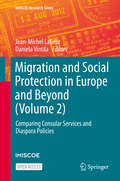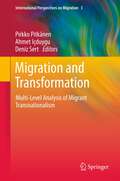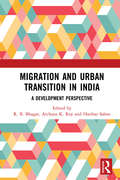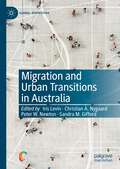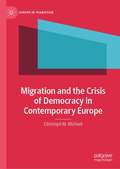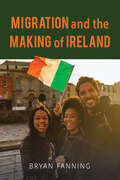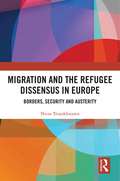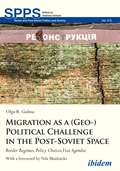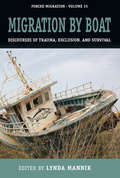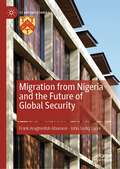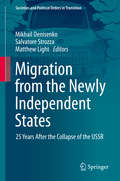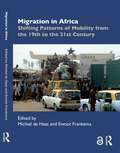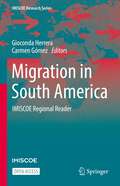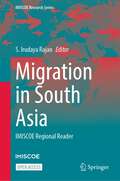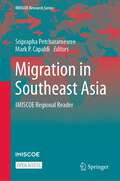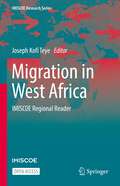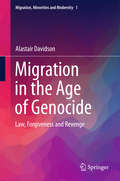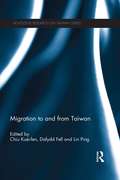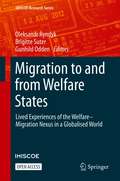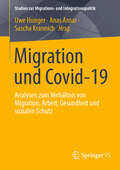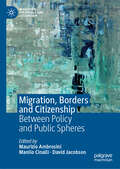- Table View
- List View
Migration and Social Protection in Europe and Beyond: Comparing Consular Services and Diaspora Policies (IMISCOE Research Series)
by Jean-Michel Lafleur Daniela VintilaThis second open access book in a series of three volumes examines the repertoire of policies and programmes led by EU Member States to engage with their nationals residing abroad. Focusing on sending states’ engagement in the area of social protection, this book shows how a series of emigration-related policies that go beyond the realm of social security address the needs of nationals abroad in the area of health care, unemployment, family benefits, pensions and economic hardship. In addition, this volume highlights the variety of sending states’ institutions that are involved in these policies (consulates, diaspora institutions, ministries, agencies…) and their engagement with citizens abroad in other policy areas such as electoral rights, citizenship, language, culture, education, business or religion. As such this book is a valuable read to researchers, policy makers, government employees and NGO’s.
Migration and Transformation:
by Pirkko Pitkänen Deniz Sert Ahmet IçduyguPeople's transnational ties and activities are acquiring ever greater importance and topicality in today's world. The focus of this book lies in the complex and multi-level processes of migrant transnationalism in four transnational spaces: India-UK, Morocco-France and Turkey-Germany and Estonia-Finland. The main question is, how people's activities across national borders emerge, function, and change, and how are they related to the processes of governance in increasingly complex and interconnected world? The book is based on the findings of a three-year research project TRANS-NET which brough together internationally acknowledged experts from Europe, Asia and Africa. As no single discipline could investigate all the components of the topic in question, the project adopted a multi-disciplinary approach: among the contributors, there are sociologists, policy analysts, political scientists, social and cultural anthropologists, educational scientists, and economists. The chapters show that people's transnational linkages and migration across national boundaries entail manifold political, economic, social, cultural and educational implications. Although political-social-economic-educational transformations fostered by migrant transnationalism constitute the main topic of the book, the starting assumption is that the large-scale institutional and actor-centred patterns of transformation come about through a constellation of parallel processes.
Migration and Urban Transition in India: A Development Perspective
by R. B. Bhagat Archana K. Roy Harihar SahooMigration has emerged as an important issue in contemporary global politics and in the discourse around human development. This book highlights the role of migration in socioeconomic development and its interdependence with urbanization, employment, labour and industry. This volume identifies the challenges which migration and the subsequent dynamism in population and spatial parameters pose to land-use patterns, ecology, social politics and international relations. Through a study of migration patterns and trends in different parts of India, this collection analyzes the relationship of migration with social and occupational mobility, poverty and wealth indices, inequality, distribution of resources and demographic change. It also explores policy measures and frameworks which can bring migration into the fold of national development strategies. Timely and comprehensive, the book underscores the importance of migration and urbanization, sustainability and inclusivity to economic growth and development. It will be an essential read for scholars and researchers of migration studies, political studies, sociology, urban studies, development studies and political sociology.
Migration and Urban Transitions in Australia (Global Diversities)
by Iris Levin Christian A. Nygaard Peter W. Newton Sandra M. GiffordThis book offers a critical reflection on the ways in which migration has shaped Australia’s cities, especially over the past twenty years. Australian cities are among the world’s most culturally diverse and are home to most of the nation’s population. This edited collection brings together contemporary research carried out by scholars across a range of diverse disciplines, all of whom are concerned with the intersections between migration and urban change. The chapters are organised under three sections: demographic, settlement and environmental transitions; urban form and housing transitions; and socio-cultural transitions. Drawing on diverse theoretical and methodological approaches, the chapters engage with a range of factors and influences affecting migration and urban development. This book will be of special interest to scholars and practitioners in the disciplines of sociology, urban planning, geography, public policy and environmental sustainability.
Migration and the Contested Politics of Justice: Europe and the Global Dimension (Routledge Studies on the European Union and Global Order)
by Giorgio GrappiThis book discusses the politics of justice in relation to migration addressing both the controversies of governance and the active role of migrants’ struggles in shaping the materiality of justice. Considering justice and migration as globally contested fields, the book questions received wisdoms of European migration politics, including images of a migratory ‘crises’, the reconfiguration of the borders of justice, and the spurious pretensions of controlling and governing mobility. Gathering global scholars from migration studies, international relations and critical theory, as well as social activists, it advances an extended concept of contestation that goes beyond the simple clash of interests between national and international political actors. As such the book expands the discourse to a wider politics of justice and advances different angles and methodological perspectives from which to question purely normative conceptions of justice. Looking beyond the simple transformations in laws and regulations, the book updates the debate on migration adopting a global perspective. This book is of key interest to scholars and students of migration studies, European studies, global justice, and labour, gender and EU studies.
Migration and the Crisis of Democracy in Contemporary Europe (Europe in Transition: The NYU European Studies Series)
by Christoph M. MichaelThis innovative and thought-provoking study puts forth a compelling analysis of the constitutive nexus at the heart of the European refugee conundrum. It maps and historically contextualises some of the distinctive challenges that pervasive ethnic and cultural pluralism present to real politics as on the level of political theorizing. By systematically integrating hitherto insufficiently linked research perspectives in a novel way, it lays open a number of paradoxical constellations and regressive tendencies in contemporary European democracy. It thereby redirects attention to the ways in which liberal thought and liberal democratic institutions shape, interact with, and may even provide justification for illiberal and exclusionary practices. This book thus makes an important contribution to the analysis of post-migrant realities in Europe and the ways in which they are defined by imperial legacies, punitive migration regimes, the culturalization of mainstream politics, and the discursive construction of a European Other.
Migration and the Making of Ireland
by Bryan FanningIreland has been shaped by centuries of emigration as millions escaped poverty, famine, religious persecution, and war. But what happens when we reconsider this well-worn history by exploring the ways Ireland has also been shaped by immigration?From slave markets in Viking Dublin to social media use by modern asylum seekers, Migration and the Making of Ireland identifies the political, religious, and cultural factors that have influenced immigration to Ireland over the span of four centuries. A senior scholar of migration and social policy, Bryan Fanning offers a rich understanding of the lived experiences of immigrants. Using firsthand accounts of those who navigate citizenship entitlements, gender rights, and religious and cultural differences in Ireland, Fanning reveals a key yet understudied aspect of Irish history. Engaging and eloquent, Migration and the Making of Ireland provides long overdue consideration to those who made new lives in Ireland even as they made Ireland new.
Migration and the New Technological Borders of Europe
by Huub Dijstelbloem Albert MeijerEuropean borders that aim to control migration and mobility increasingly rely on technology to distinguish between citizens and aliens. This book explores new tensions in Europe between states and citizens, and between politics, technology and human rights.
Migration and the Refugee Dissensus in Europe: Borders, Security and Austerity
by Nicos TrimikliniotisThis book provides an explanation for the fundamental disagreement pertaining to immigration and asylum in Europe. Since the collapse of consensus with the end of the Cold War, immigration and asylum have increasingly emerged as a central socio-political issue in Europe. The present work attempts to move beyond the complexity of ‘managing’ migratory flows by focusing on the most daunting issues arising from the response to the ‘refugee crisis’ in Europe. This debate is intimately connected to borders, security, belonging, citizenship and labour precarity/inequality. The book addresses some crucial dimensions related to the migration and asylum dissensus by providing an integrated frame of analysis from the point of view of resistance, rather than that of power. It connects notions of belonging and the migrant integration with the processes of de-democratisation, racist populism, citizenship and authoritarian migration regimes, and contributes towards a theory of the asylum and immigration dissensus by examining the potential for transition towards a society of equality and rights. The author proposes that the encounter(s) with surplus populations in Europe, which result in the multiplication of liminal regimes as well as spaces for resistance, generates potential for social imaginaries, promising a society unimaginable in previous epochs. This book will be of much interest to students of migration and border studies, global governance, European politics and International Relations.
Migration as a: Border Regimes, Policy Choices, Visa Agendas (Soviet and Post-Soviet Politics and Society #212)
by Olga R. GulinaOver the last three decades, migration management in the newly independent states which emerged from the ruins of the USSR in 1991 has become a tool for staking out zones of influence, a winning slogan for election campaigns, and a handle on the domestic population. Such an instrumentalization of migration is widespread in all post-Soviet republics. (Geo-)political games around migration issues are also a mechanism of foreign influence and a method of destabilization across the former USSR as well as an apology for slowing down reforms and even for transforming their character or vector. The ruling elites of the newly independent states exploit, with different degrees of intensity and success, institutions and rules of migration laws, including the granting of citizenship, asylum, temporary and permanent residence authorization, etc., in order to advance certain foreign and domestic policies. The directions of various post-Soviet nations’ migration policies—be they pro-European, pro-Asian, or pro-Russian—are informed less by a pursuit of cultural, historical, or economic advantages for the respective countries and their populations than by the dynamics of geopolitical rivalry and often by the principle “either an ally or a rival; there is no middle ground.” This fascinating volume explains why shifts in migration management in the post-Soviet countries are both causes for and consequences of political changes that influence foreign and domestic policy making.
Migration by Boat: Discourses of Trauma, Exclusion and Survival
by Lynda MannikAt a time when thousands of refugees risk their lives undertaking perilous journeys by boat across the Mediterranean, this multidisciplinary volume could not be more pertinent. It offers various contemporary case studies of boat migrations undertaken by asylum seekers and refugees around the globe and shows that boats not only move people and cultural capital between places, but also fuel cultural fantasies, dreams of adventure and hope, along with fears of invasion and terrorism. The ambiguous nature of memories, media representations and popular culture productions are highlighted throughout in order to address negative stereotypes and conversely, humanize the individuals involved.
Migration from Nigeria and the Future of Global Security (St Antony's Series)
by Frank Aragbonfoh Abumere John Sodiq SanniThis book explores the possible (actual, potential and imagined) future security threats migration from Nigeria could pose to Europe, the United States of America, Canada and to some extent Australia. The negative consequences of terrorism, resource curse, extreme poverty, bad governance and illiteracy are highly likely to compound the already existing migration (both legal and illegal migration) from Nigeria to Europe. Given the current nationalist and populist tendencies in the United States of America and many parts of Europe, which have amplified the securitization of migration, the authors argue that the continuous high influx of legal and illegal migrants from Africa is a potential global security case.
Migration from the Newly Independent States: 25 Years After the Collapse of the USSR (Societies and Political Orders in Transition)
by Matthew Light Mikhail Denisenko Salvatore StrozzaThis book discusses international migration in the newly independent states after the collapse of the Soviet Union, which involved millions of people. Written by authors from 15 countries, it summarizes the population movement over the post-Soviet territories, both within the newly independent states and in other countries over the past 25 years. It focuses on the volume of migration flows, the number and socio-demographic characteristics of migrants, migration factors and the situation of migrants in receiving countries. The authors, who include demographers, economists, geographers, anthropologists, sociologists and political scientists, used various methods and sources of information, such as censuses, administrative statistics, the results of mass sample surveys and in-depth interviews. This heterogeneity highlights the multifaceted nature of the topic of migration movements.
Migration in Africa: Shifting Patterns of Mobility from the 19th to the 21st Century
by Michiel De HaasThis book introduces readers to the age of intra-African migration, a period from the mid-19th century onward in which the center of gravity of African migration moved decisively inward. Most books tend to zoom in on Africa’s external migration during the earlier intercontinental slave trades and the more recent outmigration to the Global North, but this book argues that migration within the continent has been far more central to the lives of Africans over the course of the last two centuries. The book demonstrates that only by taking a broad historical and continent-wide perspective can we understand the distinctions between the more immediate drivers of migration and deeper patterns of change over time. During the 19th century Africa’s external slave trades gradually declined, whilst Africa’s expanding commodity export sectors drew in domestic labor. This led to an era of heightened mobility within the region, marked by rapidly rising and vanishing migratory flows, increasingly diversified landscapes of migration systems, and profound long-term shifts in the wider patterns of migration. This era of inward-focused mobility reduced with a resurgence of outmigration after 1960, when Africans became more deliberate in search of extra-continental destinations, with new diaspora communities emerging specifically in the Global North. Broad ranging in its temporal, spatial, and thematic coverage, this book provides students and researchers with the perfect introduction to age of intra-African migration.
Migration in South America: IMISCOE Regional Reader (IMISCOE Research Series)
by Gioconda Herrera Carmen GómezThis open access regional reader examines emerging issues around new migration patterns in South America and their relationship with changing migration policies over the last twenty years. The first part of the book looks at conceptual discussions on mixed and survival migration, the link between migration and extractivism, and the specific character of transit migration. A second part examines how these debates have led to transformations in state policies, and the shift in government policies from a human rights-based approach towards more restrictive ones. Finally, the third section revisits the relationship between racism, xenophobia and colonialism in contemporary migrations. As such this book makes an interesting read to students, academics, policy makers and all those working in the field.
Migration in South Asia: IMISCOE Regional Reader (IMISCOE Research Series)
by S. Irudaya RajanThis open access Regional Reader provides a contemporary look at the emerging challenges and issues facing South Asian migration amidst covid-19 and discusses a framework for a sustainable and cooperative migration from and within the region, which will impact both the economic and regional development of South Asia. The book draws a focus on this area through an interdisciplinary and holistic lens and follows the three broad areas of migration studies in South Asia: Governance and mobility, Family, health and demography, and Forced migration. It thereby covers a number of issues from South Asian countries such as Afghanistan, Bangladesh, Bhutan, India, Nepal, Pakistan and the Maldives. This book is a valuable resource for those who want to understand the dynamics of migration from the largest migrant-sending region in the world and one which will determine the shape of global migration patterns in the future.
Migration in Southeast Asia: IMISCOE Regional Reader (IMISCOE Research Series)
by Sriprapha Petcharamesree Mark P. CapaldiThis open access IMISCOE Regional Reader explores the issues faced by migrant groups in Southeast Asia and the challenges of getting of their human rights recognized. It analyses the different responses, or lack thereof, of the Association of Southeast Asian Nations (ASEAN) to these highly complex situations which are shaped by contemporary debates around borders and concepts of states, migrants’ rights as well as access to citizenship and how these concepts and paradigms are intertwined with issues such as agency and resilience of migrants. Crucial attention is given to the region’s lesser known populations and issues such as the Vietnamese in Thailand, people of Indonesian descent (PIDs) in Southern Philippines, independent child migrants across the region, and the vulnerabilities of migrant workers facing the COVID-19 pandemic. With its unique regional focus, this book provides a valuable resource to those studying human rights and migration issues, policy makers and researchers and students.
Migration in West Africa: IMISCOE Regional Reader (IMISCOE Research Series)
by Joseph Kofi TeyeThis open access Regional Reader examines the dynamics and impacts of international migration within and from West Africa. The book presents key theoretical perspectives and empirical findings on historical trends, geographical patterns, drivers and socio-economic impacts of both voluntary and involuntary migration in West Africa, a region that is characterised by high level of mixed migration flows. The book is divided into three main parts: changing patterns and governance of migration, managing environmental and forced migration, and diaspora, transnationalism and development. The chapters raise key research questions and outline recommendations for improving migration governance, protecting migrants and harnessing the benefits of migration for socio-economic development for both countries of origin and destination of migrants. As such this Regional Reader provides an interesting read to students, academics, researchers, migration experts, development practitioners and policy makers.
Migration in the Age of Genocide
by Alastair DavidsonThis book presents a novel proposal for establishing justice and social harmony in the aftermath of genocide. It argues that justice should be determined by the victims of genocide rather than a detached legal system, since such a form of justice is more consistent with a socially grounded ethics, with a democracy that privileges citizen decision-making, and with human rights. The book covers the Holocaust; genocides in Argentina, South Africa, Rwanda, Latin America, and Australia, as well as crimes against humanity in Italy and France. From show trials to state- enforced forgiveness, the book examines various methods that have been used since 1945 to punish the individuals and groups responsible for genocide and how they have ultimately failed to deliver true justice to the victims. The only way to end this failure, the book points out, is to return justice to the victims. This simple proposition; however, challenges the Enlightenment tradition of Western law which was built on the refusal to allow victims to determine the measure of justice. That would amount, according to Bacon, Hegel, and Kant to a revenge system and bring social chaos. But, as this book points out, forgiveness is only something victims can give, no-one can demand it. In order to establish a lasting peace, it is necessary to re-examine the philosophical and theoretical refusal to return justice to the victims. The engaging argument put forth in this book can help deliver true justice and re-establish international social harmony in the aftermath of genocide. Genocide is ubiquitous in the modern, global world. It's understanding is highly relevant for the understanding of specific and perpetuating challenges in migration. Genocide forces the migration of millions to avoid crimes against humanity. When they flee war zones they bring their fears, hates, and misery with them. So migration research must engage fully with the experience of genocide, its human conseque nces and the ethical dilemmas it poses to all societies. Not to do so, will make it more difficult to understand and live with newcomers and to achieve some sort of harmony in host countries, as well as those which are centers of genocide.
Migration in the Mediterranean
by Ippolito, Francesca and Trevisanut, Seline Francesca Ippolito Seline TrevisanutMediterranean states have developed various cooperation mechanisms in order to cope with the issues that arise from migration. This book critically analyses how institutional actors act and interact on the international scene in the control and management of migration in the Mediterranean. It highlights how, even though the involvement of 'universal' international organisations guarantees a certain balance in setting the goals of cooperation mechanisms and buttresses a certain coherence of the actions, the protection of migrants' fundamental rights is still an objective as opposed to a reality, and security imperatives and trends still prevail in the aftermath of the 2011 Arab Spring.
Migration to and From Taiwan (Routledge Research on Taiwan Series)
by Dafydd Fell Chiu Kuei-Fen Lin PingMigration has transformed Taiwanese society in the last 20 years. The main inflows have been temporary workers from Southeast Asian countries and female spouses from Southeast Asia and China marrying Taiwanese husbands. The main outflow has been migration to China, as a result of increased economic integration across the Taiwan Strait. These changes have significantly altered Taiwan’s ethnic structure and have profound social and political implications for this new democracy. As large numbers of these migrants take Taiwanese citizenship and their offspring gain voting rights, the impact of these "new Taiwanese" will continue to increase. This book showcases some of the leading researchers working on migration to and from Taiwan. The chapters approach migration from a range of disciplinary perspectives, including international relations, sociology, social work, film studies, political science, gender studies, geography and political economy and so the book has great appeal to scholars and students interested in the politics of Taiwan, Taiwanese society and ethnic identity as well as those focusing on migration in East Asia and comparative migration studies.
Migration to and from Welfare States: Lived Experiences of the Welfare–Migration Nexus in a Globalised World (IMISCOE Research Series)
by Brigitte Suter Oleksandr Ryndyk Gunhild OddenThis open access book explores the role of family, public, market and third sector welfare provision for individual and households’ decisions regarding geographical mobility. It challenges the state-centred approach in research on welfare and migration by emphasising migrants’ own reflections and experiences. It asks whether and in which ways different welfare concerns are part of migrants’ decisions regarding (or aspirations for) mobility. Employing a transnational and a translocal perspective, the book addresses different forms of geographical mobility, such as immigration, emigration, and re-migration, circular and return migration. By bringing in empirical findings from across a variety of Western and non-Western contexts, the book challenges the Eurocentric focus in current debates and contributes to a more nuanced and more integrated global account of the welfare-migration nexus.
Migration und Covid-19: Analysen zum Verhältnis von Migration, Arbeit, Gesundheit und sozialen Schutz (Studien zur Migrations- und Integrationspolitik)
by Uwe Hunger Sascha Krannich Anas AnsarDer Band lädt dazu ein, Entwicklungen rund um die Themen Migration, Arbeit, Gesundheit und sozialer Schutz vor dem Hintergrund der COVID-19-Pandemie neu zu überdenken. In den Beiträgen wird deutlich, wie die Pandemie grundsätzliche Probleme der Migration, wie die plötzliche Schließung von Grenzen, schlechte Arbeitsbedingungen und willkürliche Entlassungen von Wanderarbeiter*innen sowie Benachteiligungen bei sozialen Dienstleistungen, wie unter einen Brennglas vergrößert und ihre Dringlichkeit deutlich gemacht hat. Mit dem Abschwächen der Pandemie sind sie damit keineswegs verschwunden, sondern allenfalls wieder aus dem Blickpunkt der öffentlichen Debatten verschwunden. Der Band zeigt auf, wo die Probleme liegen, wo hierfür die Verantwortlichkeiten liegen und wie eine für alle Seiten gewinnbringende Zusammenarbeit von Staaten und anderen Beteiligten möglich ist, um Missstände zu beheben und eine für alle vorteilhafte Migration zu ermöglichen.
Migration und Konflikt (Studien zur Migrations- und Integrationspolitik)
by Norbert Kersting Uwe Hunger Julian David MüllerKonflikte im Bereich Migration nehmen zu: Brennende Asylbewerberheime, Anschläge auf Migant:innen, rassistische Hassrede im Internet, ein Anwachsen rechtspopulistischer xenophobischer Demonstrationen und Parteien. Gerade in solch beunruhigenden Ausprägungsformen treten migrationsbezogene Konflikte häufig in Politik und Medien in Erscheinung und nähren den demokratischen Krisendiskurs. Die demokratie- und ordnungstheoretische Bedeutung sozialer Konflikte reicht allerdings weit über dieses destruktive Erscheinungsbild hinaus. Konflikte sind nicht nur ein unvermeidbares Element gesellschaftlichen Zusammenlebens, die Möglichkeit zur Austragung und Bearbeitung ist in vielen politikwissenschaftlichen Ansätzen gar zu einem Gradmesser demokratischer Qualität avanciert. So werden in diesem Sammelband politische Anerkennungs-, Teilhabe- und Teilnahmekonflikte beschrieben und die Repräsentation von Migrant*innen sowie ihre Einbindung in demokratische Entscheidungsprozesse analysiert.
Migration, Borders and Citizenship: Between Policy and Public Spheres (Migration, Diasporas and Citizenship)
by Maurizio Ambrosini Manlio Cinalli David JacobsonThis edited collection goes beyond the limited definition of borders as simply dividing lines across states, to uncover another, yet related, type of division: one that separates policies and institutions from public debate and contestation. Bringing together expertise from established and emerging academics, it examines the fluid and varied borderscape across policy and the public domains. The chapters encompass a wide range of analyses that covers local, national and transnational frameworks, policies and private actors. In doing so, Migration, Borders and Citizenship reveals the tensions between border control and state economic interests; legal frameworks designed to contain criminality and solidarity movements; international conventions, national constitutions and local migration governance; and democratic and exclusive constructions of citizenship. This novel approach to the politics of borders will appeal to sociologists, political scientists and geographers working in the fields of migration, citizenship, urban geography and human rights; in addition to students and scholars of security studies and international relations.
